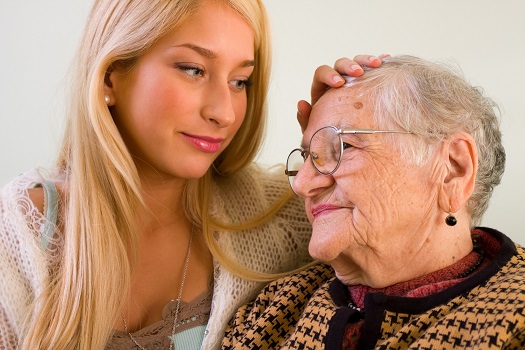After a senior loved one has had a stroke, there may be countless thoughts that cross your mind while waiting to see how he or she has been affected and what recovery steps will be necessary. The most important thing to remember is that every stroke survivor is different, so make an effort to stay positive and—more importantly—exude this positive attitude with your loved one. The following are a few additional tips for how to move forward after a loved one’s stroke.
Be Honest with Your Loved One
Your loved one is likely to have questions after the stroke. Be as honest as possible by explaining what happened while offering reassurance and comfort. During this time, address any changes in your parent’s abilities, and work with his or her doctor and physical, occupational, and speech therapists to create a comprehensive recovery plan. It’s important to set realistic expectations for recovery, as many stroke survivors may not see progress for as long as 3–4 months and sometimes longer, depending on the extent of the stroke.
A stroke is a serious health issue that impacts an older adult’s health, wellbeing, and independence. If your senior loved one needs professional in-home care, Home Care Assistance is here to help. We are a trusted provider of respite and 24-hour care, and we also offer specialized Alzheimer’s, dementia, Parkinson’s, and stroke care for seniors.
Learn as Much as Possible about Strokes
Become an educated caregiver and learn as much as possible about your loved one’s stroke, possible side effects, and treatment options. While your loved one’s doctor is a great resource, there are also many reputable websites filled with information and forums where you can find answers to any questions you may have.
It’s also important to learn about your loved one’s prescribed medications. Some stroke medications have side effects, so ask the doctor for a list of medications your loved one is taking and what side effects you need to watch out for while helping him or her recover.
Participate in Post-Hospitalization Plans
Be active in decisions about your parent’s post-hospital care, which may include a short stay in a rehabilitation facility or nursing home during the initial recovery period. If your loved one isn’t able to clearly articulate his or her wishes, consider what he or she would most likely want, and voice your concerns while plans are being made.
For many seniors, aging in the comfort of home provides the most peace of mind. Home care is a great option for senior stroke survivors because it includes help with meal preparation, personal care activities, and transportation to medical appointments.
In Barrie, at-home care providers can benefit aging adults in a variety of ways. From cooking nutritious meals to offering timely medication reminders, the dedicated caregivers at Home Care Assistance are available to help your elderly loved one 24 hours a day, 7 days a week.
Get Support for Yourself
Caregivers often need support to manage the emotions that go along with seeing how strokes affect their loved ones. Hospital staff can usually direct you toward some type of support group (sometimes within the hospital) or outside resources where you can share your feelings, find caregiving tips, and talk openly about current issues you’re facing.
For some families, caring for a senior loved one can be overwhelming at times. Luckily, they can rely on professional respite care. Barrie, ON, Home Care Assistance is a trusted name in respite and hourly care. Our caregivers are available around the clock to assist seniors with bathing, transportation, medication reminders, exercise, and much more, allowing families the time they need to focus on other important responsibilities or just take a break. Call one of our Care Managers at 647-970-3803 to learn about our customized in-home care plans.
